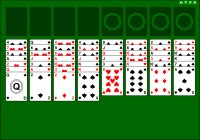FreeCell Solitaire Rules
 Thanks to Microsoft's inclusion of a version of the game in Windows 95, Freecell solitaire has become one of the world's most popular solitaires. Unlike Klondike (probably the best-known solitaire game), Freecell is quite winnable. In fact, the vast majority of Freecell hands can be solved.
Thanks to Microsoft's inclusion of a version of the game in Windows 95, Freecell solitaire has become one of the world's most popular solitaires. Unlike Klondike (probably the best-known solitaire game), Freecell is quite winnable. In fact, the vast majority of Freecell hands can be solved.
Freecell is an "open" solitaire, so-called because all of the cards are visible at the start of a game. It is a descendant of earlier games such as "Eight Off" and "Baker's Game".
Freecell Rules
Number of Decks: 1
Initial Layout: Cards are dealt face-up into eight columns. The first four columns each contain seven cards, and the last four contain six cards each. Space is set aside for four foundation piles and four "free cells" -- holding stations where cards may be temporarily stored during play.
Object: The object of the game is to move the four aces, as they appear, to the foundations, and build each up in suit from ace to king (A-2-3-4-5-6-7-8-9-10-J-Q-K).
Play: Only the top (exposed) card of each tableau pile is available for play. It may be moved to a foundation pile, a free cell, or to another tableau pile. Within the tableau, cards are built down in sequence and alternating in color. Any card may be moved into an empty space. Blocks of cards may not be moved, unless the requisite number of free cells and/or tableau spaces are availabe to allow each individual card to be moved. If you fill all four foundation piles, you win.
Other Resources: FreeCell FAQ, FreeCell Solitaire - A Winning Strategy, Freecell PowerMoves Explained
Other Sources of FreeCell Solitaire Rules
- Wikipedia
- BVS Development
- Goodsol Development
- LenaGames
- Rapture Technologies
- Semicolon Software
- Smallware
- Digital Smoke
- SoliTaire Network
- TreeCardGames
Note: All rule links open in a new window.





